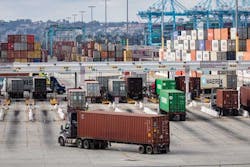Voltera Electrifying Ports of Savannah, Los Angeles, and Long Beach to Accelerate Zero-Emission Freight Operations
Voltera, a developer, owner, and operator of charging infrastructure for zero-emission vehicle (ZEV) fleets, announced its owned sites near the Port of Savannah in Georgia and the Ports of Los Angeles and Long Beach in California will receive $9.6 million in federal funding to support Voltera's vision of electrifying America's ports.
Each site will be built from the ground up, and EV charging will be made available to customers through multiple contracting models. These projects will help accelerate the transition to zero-emission freight operations and the decarbonization of key logistics hubs, as designated through the recently released US Zero-Emission Freight Corridor Strategy.
Project funding was provided by the Federal Highway Administration (FHWA) through the US Department of Transportation's Reduction of Truck Emissions at Port Facilities (RTEPF) program.
“The assistance from the administration and state and local government agencies has been critically helpful,” said Matt Horton, CEO of Voltera. “Having a roadmap in terms of how to roll out freight corridors allows us to catalyze a lot of investment from the private sector to complement the incentives that the government has provided.”
Developed in partnership with Georgia Power, Voltera's Savannah site will deliver up to 23 MW of charging capacity with more than 120 charging stalls to accommodate Class 8 electric drayage trucks servicing the Port of Savannah. The site will enable efficient, resilient, and sustainable drayage operations at the Port, and Voltera estimates the site will reduce emissions by 37,000 metric tons per year.
Voltera's charging site in Wilmington, California, was selected due to its adjacency to critical connection routes to the Port of Los Angeles and the Port of Long Beach. The site will feature 20 charging stalls for Class 8 electric trucks and deliver up to 4 MW of charging capacity. Voltera estimates the site will reduce emissions by up to 6,300 metric tons annually.
“We struggle with unhealthy air and negative public health impacts from port pollution, much of it from the thousands of diesel-burning trucks that bring goods to and from the Port of Los Angeles every day. Our communities will benefit directly from this federal investment in electric truck charging. We will be able to reduce emissions at our port, create good paying jobs, and improve our communities’ public health," said Congresswoman Nanette Barragan.
About the Author
EnergyTech Staff
Rod Walton is head of content for EnergyTech.com. He has spent 17 years covering the energy industry as a newspaper and trade journalist.
Walton formerly was energy writer and business editor at the Tulsa World. Later, he spent six years covering the electricity power sector for Pennwell and Clarion Events. He joined Endeavor and EnergyTech in November 2021.
He can be reached at [email protected].
EnergyTech is focused on the mission critical and large-scale energy users and their sustainability and resiliency goals. These include the commercial and industrial sectors, as well as the military, universities, data centers and microgrids.
Many large-scale energy users such as Fortune 500 companies, and mission-critical users such as military bases, universities, healthcare facilities, public safety and data centers, shifting their energy priorities to reach net-zero carbon goals within the coming decades. These include plans for renewable energy power purchase agreements, but also on-site resiliency projects such as microgrids, combined heat and power, rooftop solar, energy storage, digitalization and building efficiency upgrades.
